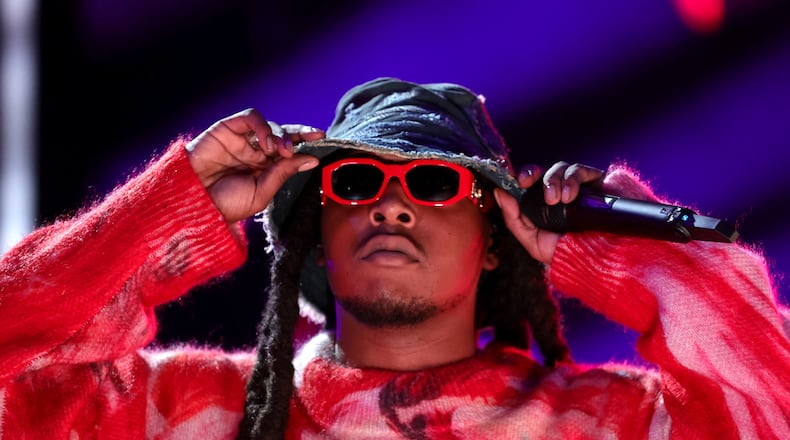Among Atlanta’s lush terrain of rap artists, Takeoff’s Southern-influenced lyrical precision and elusive demeanor made him a beloved yet often overshadowed character. As a member of the Grammy-nominated Migos, he provided the rudimentary rap skills to catapult the trio into superstardom.
Born Kirsnick Khari Ball, Takeoff, 28, died on Nov. 1 during an altercation outside of Houston’s 810 Billiards & Bowling. A funeral service will be held at noon on Friday at State Farm Arena.
Takeoff’s death not only adds an ominous tinge to the current state of the city’s influential rap scene, but it closes the chapter of a group that redefined Atlanta rap and culture for the past decade.
Takeoff found success with side projects, including the release of his solo album, “The Last Rocket,” and as one half of the duo Unc & Phew with his uncle and fellow Migos member Quavo.
With Takeoff as the foundation, Migos’ style of rapping, adorned by piercing staccato rhythms, became a standard for the genre.
“I think (Atlanta rap) is at a turning point, and there’s an opportunity to address some of the issues that Atlanta is facing, particularly in its poor and working-class communities,” said Joycelyn Wilson, an assistant professor at Georgia Tech. “I believe that spills over into gang and criminal activity that intersects with rap and hip-hop culture.”
This year also witnessed the deaths of prominent Atlanta rappers Lil Keedand Trouble. In May, genre mainstays Gunna and Young Thug were arrested on racketeering charges. Both rappers remain in jail.
Atlanta native and platinum-selling rapper Deante’ Hitchcock said he’s become desensitized to the death of hip-hop artists, but says hip-hop isn’t the source of violence.
“Hip-hop culture is indicative of the experiences in America,” Hitchcock said. “I don’t think people are inherently violent. I think if you sit any animal in a cage where the conditions are harsh, the animal will fight to survive, and I think entertainment is hyperfocused in Black spaces on respect, ego, sex and authenticity. It’s one thing to rap about certain things, but I think it’s expected in spaces with people of color to prove those things.”
How Migos shaped Atlanta culture
Following their 2011 debut mixtape “Juug Season,” Migos released a bevy of mixtapes that not only gained traction in Atlanta but cemented the trio as an integral part of 2010s rap. They were signed to Atlanta-based label Quality Control and garnered mainstream attention in 2013 with their first hit “Versace,” which received a boost with a remix featuring Drake.
Migos became arguably one of the biggest rap acts in the world with the release of their 2016 smash hit “Bad and Boujee.” The single stayed No. 1 on the Billboard Hot 100 for three weeks.
Maurice Hobson, a historian and associate professor of Africana studies at Georgia State University who was recently featured in the documentary “Untrapped: The Story of Lil Baby,” said Takeoff’s death marks a monumental loss of a group that embraced Atlanta culture.
“Migos’ rise is a continuation of the soul and funk sound that comes out of the ‘70s, that moves from disco to soul and funk and then the rise of what kind of comes out of the late 80′s and early 90′s that establishes the rise of the Dirty South that really promotes Outkast, Goodie Mob, Organized Noize, The Dungeon Family,” Hobson said. “Then you go into snap and trap. Migos represents it as this kind of new vignette of Atlanta Black popular culture.”
Christina Lee, an Atlanta-based culture reporter, said Migos, with Takeoff as the primary architect, provided trap music with a renewed relevancy for mainstream audiences.
“I think Takeoff lent the group a lot of technical proficiency and therefore credibility,” Lee said. “Beyond ‘Versace’ and when that hype started dying down and everyone started doing the triplet flow, folks were left to sort of reckon with, “Oh this group can really rap.’ While Quavo can stand on his own and Offset can stand on his own, usually folks would look to Takeoff as a prime example of how much the group really had to contribute.”
“Call Casting,” a single from the group’s Grammy-nominated album “Culture,” is one of many tracks on which Takeoff’s flow shines. His commanding presence throughout the nearly four-minute-long track oozes with seamless adlibs and nursery rhyme-style bars that anchor a song about a typical day of trapping in Atlanta.
Migos’ form of rapping proves that rap’s stylistic conventions are just as inherent to the genre as its lyrical content. It’s not just about what you’re saying, but how.
.
“Migos’ rise is really the story of urban renewal and gentrification, and what I call the Olympification of Atlanta,” said Hobson. “Basically, when Atlanta wins the bid for the Olympics in 1990, we see a city where...low-income Black people and others are pushed out of the city and into the suburbs,” including Clayton, DeKalb and Gwinnett counties. “So Migos coming out of Gwinnett kind of rectifies this notion that Atlanta isn’t just the city of Atlanta. It’s the city, state of Atlanta. No one can deny their stardom.”
Credit: TNS
Credit: TNS
Representing the ‘Nawfside’
Justin Alexander, a YouTube content creator from Lilburn who attended Berkmar High School with Takeoff and Quavo, said Migos gave Gwinnett County hip-hop credibility.
“It was tough (to be from here),” Alexander said. “And we didn’t have any other famous rappers from here. They definitely represented the North Side and put us on the map. With Takeoff, you can tell he was just here to rap and have fun with it. That’s what made him stand out. That’s why he was a lot of people’s favorite around here, as well.”
Nicole Hendrickson, the chair of the Gwinnett County Board of Commissioners, said the group regularly gave back to the community, including Quavo’s annual Huncho Day celebration at Berkmar High School.
“They’ve made our community extremely proud because they’ve been able to break so many molds and transcend barriers,” Hendrickson said. “It was just proud to see them come up the ranks and rise to the level of fame that they acquired in such a short period of time, so to see a tragedy unfold like this is just extremely heartbreaking for our community.”
About the Author
The Latest
Featured





